ALL ARTWORK BY BIANCA STRAUCH / MJAM MJAM HAMBURG
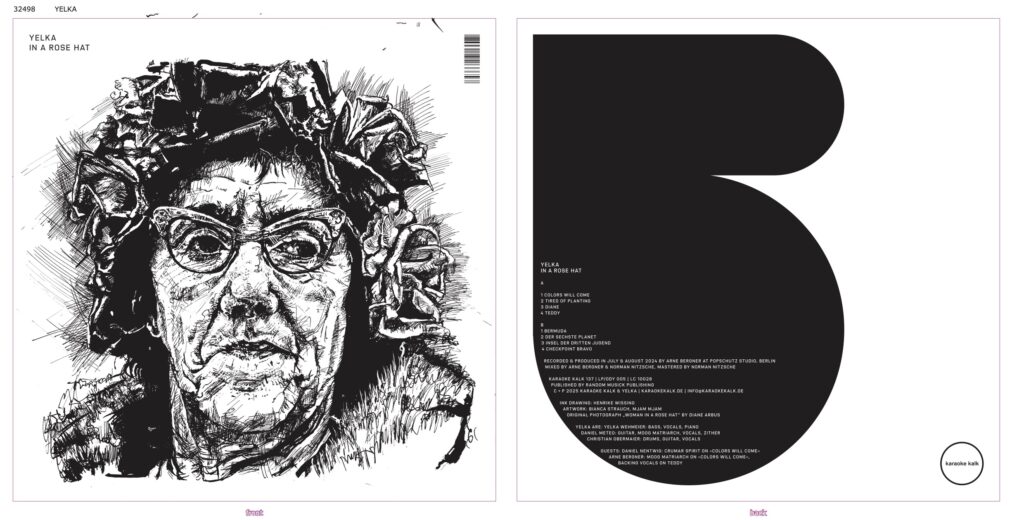
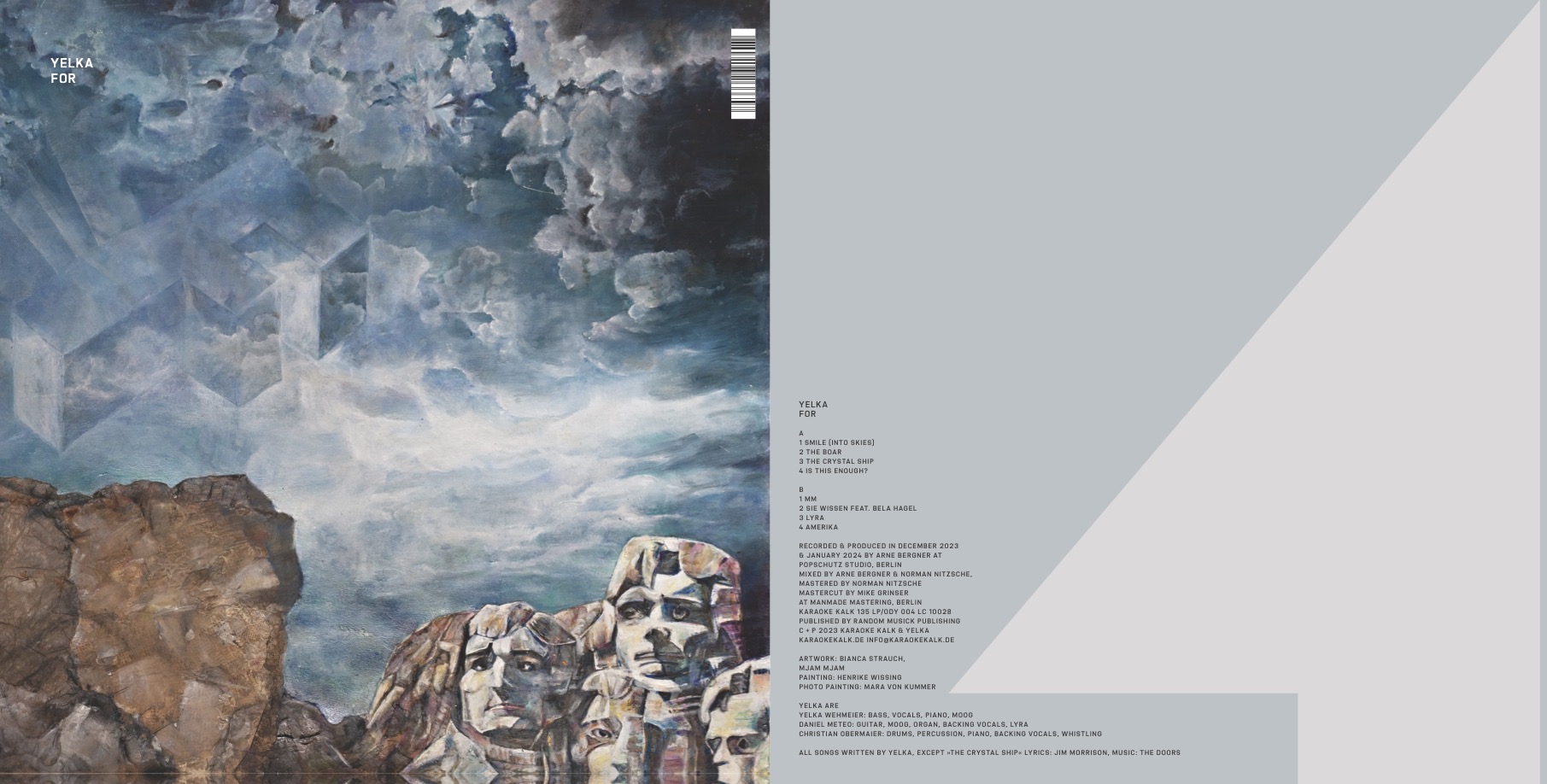
ODY 04 – FOR
TAZ ARTICLE by stefanie grimm
„Krieg und Ferien“ – klingt nach Tolstois Klassiker, weitergesponnen in die Gegenwart. Für drei Berliner:innen – zusammen sind sie Yelka – beschreibt der Titel ihres zweiten Albums aber auch den Gründungskontext ihres Postkraut-Trios während der Coronapandemie: Welche ja wiederum mit „Krieg und Ferien“ adäquat beschrieben ist. Plötzlich blieb nämlich viel Zeit, um Liegengebliebenes zu erledigen. Zugleich offenbarte die Seuche gesellschaftliche Bruchstellen.
Bassistin Yelka Wehmeier und Schlagzeuger Christian „Obi“ Obermaier spielten seit 2009 bei Eagle Boston zusammen. In der Pandemie wanderte ihr Keyboarder aus. Daniel Meteo, im Brotberuf Musikmanager und Mitbetreiber des Labels Shitkatapult, aber auch Gelegenheitsmusiker (so veröffentlichte er, zusammen mit Tom Thiel, als Bus angedubbte Electronica) stieß zur Band, nachdem er mit Obermaier in der Uckermark Fußball gespielt hatte.
Obwohl er gar kein Keyboarder ist. Ihre Bandwerdung, erzählen sie beim Interview in Wehmeiers Wohnung, die mittwochs zum Proberaum wird, war sowieso eher gemeinsamem Humor geschuldet als einem musikalischen Plan.
Jeden Tag am Computer
Meteo hatte genug vom elektronischen Musikschaffen. „Irgendwann wollte ich das nicht mehr. Ich sitze sowieso jeden Tag am Computer.“ Nach Jahrzehnten nahm er wieder seine Gitarre in die Hand. Als er versuchte, das Eagle-Boston-Material zu erlernen, stellten die drei fest, dass es das nicht braucht.
„Am besten waren wir von Anfang an, wenn wir frei spielen. Da kommen wir schnell auf einen Nenner“, erklärt Wehmeier. Was sich so frisch anfühlte, dass sie einen kühnen Plan fassten: Zehn Alben in drei Jahren. Gerade mal 15 Monate nach dem Debüt „Nowhere Jive“ erschien unlängst tatsächlich Album Nummer vier: „For“.
Die Idee für den seriellen Veröffentlichungszyklus bezieht das Trio von den Algorithmen
„Es gibt immer zwei Möglichkeiten“, erklärt Meteo, „Man kann drei Monate an einem Stück sitzen. Alle, die das mal gemacht haben, wissen: Die Anfangsmagie geht verloren. Auf die konzentrieren wir uns mit unserem seriellen Ansatz – und verzichten auf das, was dazukommt, wenn man Monate an etwas feilt.“
Serieller Wahnsinn
Zudem wolle man im Gespräch bleiben: „Die Algorithmus-Idee des immer wieder Neuaufgreifens aufs Analoge übertragen“ nennt Meteo das. „Die Idee war: Wenn immer neues Material kommt, brauchen wir diesen Instagram-Quatsch nicht“ – auch wenn sie mittlerweile, den beiden kleinen Labeln zuliebe, die ihre auch visuell gelungen gestalteten Alben herausbringen, Social Media mehr bedienen, als eigentlich ersehnt.
Ganz nebenbei erhalten sie so ihren Spaß am Spielen. Yelka streben nicht nach Perfektion, sie mäandern lässig durch ihre Songs. Was ganz beiläufig auch die Hörer:innen in den Schlender-Modus versetzt. Auch wenn jedes Album sein eigenes Flair und eine pophistorische Grundierung hat – „oft ist klar.
Dieses Stück gehört nicht mehr hierher, sondern ist etwas Neues“, erklärt Wehmeier – sind alle vier verbunden durch eine gewisse Luftigkeit. Dazu kommt ein Faible für eigenwillige Cover, wie sich etwa an ihrer krautig dengelnden Version des Wave-Schlagers „Tausendmal du“ zeigt, ursprünglich von der Münchener Freiheit. Oder auch ihr in andere Sphären segelnde „Crystal Ship“, eigentlich von The Doors.
Gemaltes Flakon
Erinnert ihr dank ungerader Beats scheppriges Debüt mit seiner minimalistischen Jazziness an 90er-Postrock, klingt das dritte Album „1976“ –„unser Alan-Parsons-Project-Album“– feingliedriger, wie schon der gemalte Parfümflakon auf dem Cover andeutet. Doch warum 1976?
„Für mich war es eine Zeit, in der Chartsmusik durchlässig war“, erklärt Meteo „Der Schweinerockhype war vorbei. Artrock irgendwie auch. Jazzrock-Gedudel hatte noch nicht richtig angefangen, ebenso Punk und Disco. Für mich ist es die Zeit von Joni Mitchell und Captain Beefheart. Alles war etwas offener.“ Und Beefheart, so schwärmen sie unisono, sei sowieso ihre gemeinsame Ursuppe.
Mit „For“ seien sie nun bei einem Sixties-Feeling angekommen: „Flott, ein bisschen fröhlich, nicht so schwer.“ Ein bisschen sperrig werden Yelka jedoch immer klingen. Dafür sorgt schon ihr Bandcredo, das lautet: Demokratisch Dur. Beim Versuch, zu erläutern, was gemeint ist, fallen die drei einander ins Wort.
Der Begriff stehe für das Vermeiden üblicher Schemata: „Dominante, Subdominante, Moll, Dur. Bla bla bla. Das ist nicht demokratisch“, führt Meteo aus. „Wenn man es so divers denkt, wie auch die Gesellschaft vielfältig ist, sind alle Töne gleich viel wert. Wo es für eine klassische Rockband nur AB als Möglichkeit gibt, ist für uns auch GH interessant. Plötzlich gehen viel mehr Kreuzungen auf.“ Darum, dass Yelka die Ideen ausgehen, muss man sich wirklich nicht sorgen! (TAZ)
POPCAST by Goethe Institut
Daniel Meteo, Christian Obermaier and Yelka Wehmeier have been active in the Berlin music and club scene for years, as musicians, label operators and artists – but in 2022, they hit the jackpot with their joint project Yelka: they managed to get the manager of Berlin label Fun In The Church so excited about them that he (spontaneously…?!) offered them a 10-album deal. Whether that’s true or not, it’s already an achievement that their new album For is their fifth in as many years. They also announce the next steps on their website: Album No. 10 should be ready by 2026! Restrained and relaxed, yet tricky and serene, the three meander through their largely live improvisations, which are stylistically influenced by Chicago post-rock, all of which are so joyfully recorded and sound so routine that you might believe it after all. Maybe they will make it with the 10 albums after all. (POPCAST)
BUYERS REVIEW
Vinylomaniac
5 von 5 Sternen
Passt in keine Schublade
… und das ist gut so.
Yelka, das sind Daniel Meteo, Christian Obermaier, Yelka Wehmeier und kommen aus Berlin.
Ihre Musik bedient sich vieler Genres wie u.a. Jazz, Fusion, Krautrock und Experimental. Ich habe bereits alle drei Scheiben von Yelka, demnächst wird bereits das vierte Album veröffentlicht, und auf allen drei Scheiben ist die Spielfreude, die Lust auf Spontanität und Experimentieren und wohl auch der Fokus auf “Live” gelegt. Was ich besonders mag ist, dass hier auch nach drei Platten die Produktion nicht Überhand gewonnen hat, sondern das Einfangen der jeweiligen Stimmung als Maßstab genommen wurde. Wobei sprichwörtlich “weniger ist mehr” durch die gesamten Aufnahmen zu hören ist. Als Zuhören hat man einfach viel “Raum” und kann entweder einfach nur die Musik genießen oder aber auch sich eigene musikalische Akzente hinzu denken. Auf solche Musik trifft man heute kaum noch, weil viel zu viele Bands der Technik und der Überproduktion verfallen und häufig ihren Markenkern dadurch verlieren. (AMAZON)
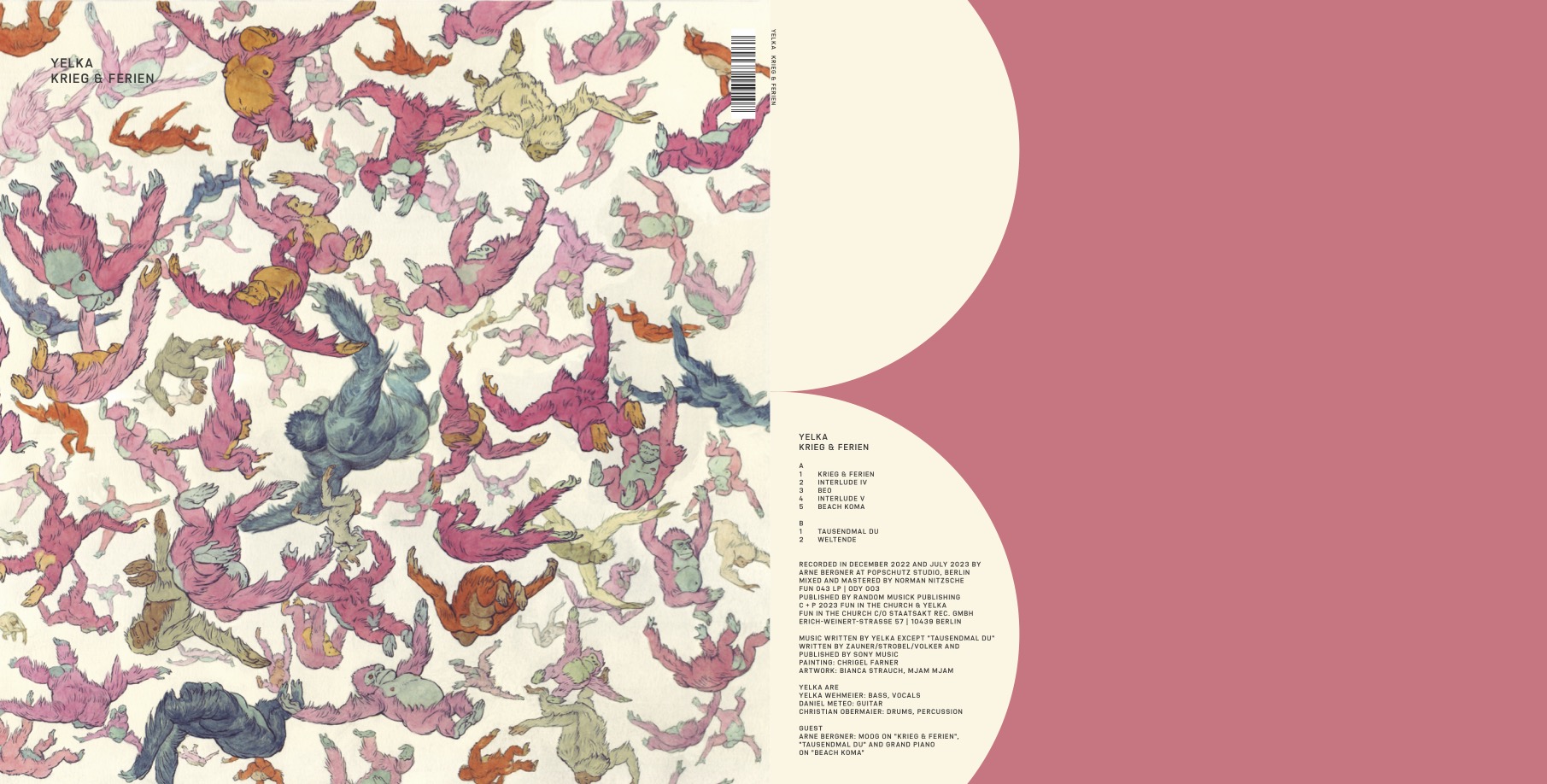
ODY 03 – KRIEG & FERIEN
REVIEW BACKSEAT MAFIA
*From pointed pates hats fly into the blue / All winds resound as so with muffled cries. / Steeplejacks fall from roofs and break in two / And on the coasts—we read —flood waters rise.
The storm has come, the seas run wild and skip /Landwards to squash big jetties there /Most people have a cold, their noses drip / Trains tumble from the bridges everywhere.*
Jakob van Hoddis – End of the world
An expressionist poem from 1911 at the head of a press release in 2023? Did some ChatGPT make that up? Hardly. Jakob van Hoddis’ poetry moved YELKA guitarist Daniel Meteo a lot as a young person and came to mind during the recording of “Krieg & Ferien”, that briefly translates into “War & Ease”, the third YELKA album this year. And so the poem became the title for the ten-minute closing piece: an improvised one-take funk jam with an uncertain outcome.
YELKA’s new album may have so much in common with Tolstoy’s novel “War & Peace”, to which the album title quite obviously alludes, that it was created in a time in which we all – for well-known reasons – have to deal with Russian society more than we have in a long time. But the Berlin trio – besides Meteo it’s Christian Obermaier on drums and Yelka Wehmeier on bass and vocals – was more concerned with other questions in the reflection of pop music: Is this lived escapism (i.e. ease?) or subculture, i.e. is the fight against mainstream declared here (i.e. war)? Or does one only condition the other? Does subculture in the end also only offer ease from the mainstream? Or does it automatically become mainstream in case of success?
Of course, it remains appealing to read the title literally. Who doesn’t go on a well-deserved vacation this year, while in the background the latest tank deliveries to Ukraine are being processed? Who doesn’t know them, the vacation photos with burning forests in the background. Isn’t nature also in a kind of state of war right now?
YELKA, who actually only found each other as a band during the Corona pandemic, remain true to their “10 albums in 3 years” master plan against all odds. Sure, so do Volkswagen and the ECB: growth forever! But with YELKA we’re only talking about limited 300 vinyl editions for now.
As with the previous albums “Nowhere Jive” & “1976” the latest album was again recorded in Berlin Popschutz and the music was mixed and mastered by Norman Nietzsche. The cover drawing by Chriegl Farner is certainly the most striking motif of the YELKA albums released so far.
In general, one has the feeling that this trio has now really come together. “Can I use your name!? Can I use your dream?!”, YELKA are asking in the album opener, reminding of Au Pairs or SLITS with the stoic beat, the dub remix com-patible bassline and its no-wave guitars. Through various interlude wormholes we suddenly land in a post-kraut cover version of “Tausendmal Du” – originally by Münchener Freiheit! A song, however, that fits amazingly well into the YELKA repertoire between Chicago-Postrock, Ruhrpott-Kraut and Berlin electronic school.
But let’s return to Jakob Van Hoddis’ World’s End poem: Even today, literary scholars debate how humoristically the poem should be read, or to what extent van Hoddis has processed the fears of technical progress of the time in his eight lines. As far as the extreme weather situations in the summer vacations of 2023 are concerned, the text, more than 100 years later, seems rather prophetic . Worryingly prophetic.
Verdict: Yelka lays down some laid-back funky jams to get you in the groove. It’s a rather low-key, late-night affair with Yelka Wehmeier taking to vocals (Indie style) on several tracks in between lush instrumentals. All players are in the zone here, with the band creating a cool collection of compositions that slowly wind, creating an almost krautrock-style hypnotic progression. Deliciously immersive music that pulls you in, and as the rhythms build, it ain’t letting go. (BACKSEAT MAFIA)
REVIEW ROUGHTRADE
The album “Krieg & Ferien” by Yelka is a captivating musical journey that was released by Fun In The Church. With its unique blend of genres and thought-provoking lyrics, this album offers a truly immersive listening experience.
Yelka’s “Krieg & Ferien” showcases their incredible talent and versatility as musicians. The album features a diverse range of musical styles, including elements of indie rock, folk, and electronic music. Each track is carefully crafted with intricate melodies and rich instrumentation, creating a dynamic and engaging sound.
One of the standout aspects of “Krieg & Ferien” is Yelka’s lyrical prowess. The songs on this album delve into deep introspection and explore themes such as love, loss, and personal growth. The poetic nature of the lyrics adds an additional layer of depth to the music, allowing listeners to connect on a profound level.
The production quality of “Krieg & Ferien” is top-notch, further enhancing the overall listening experience. The album has a polished sound that perfectly complements Yelka’s artistic vision. From the soaring vocals to the intricate instrumental arrangements, every element is meticulously crafted to create a cohesive and impactful body of work.
Whether you’re a fan of indie rock or simply appreciate well-crafted music with meaningful lyrics, “Krieg & Ferien” by Yelka is an album that should not be missed. It will take you on an emotional journey through its captivating melodies and thought-provoking lyrics. Order your copy today and immerse yourself in the enchanting world of Yelka’s “Krieg & Ferien”. (ROUGHTRADE)
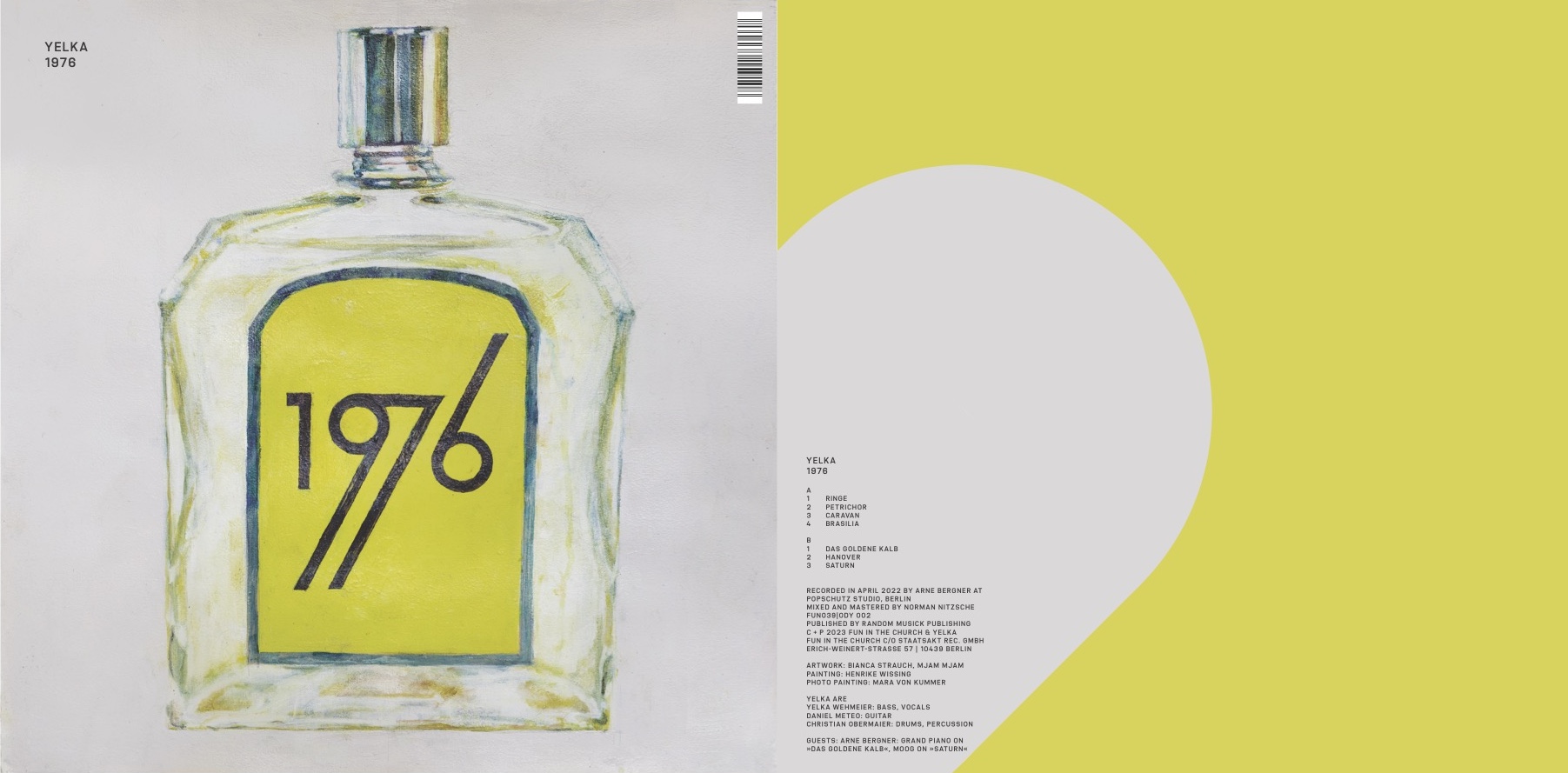
ODY 02 – 1976
REVIEW CHAIN D.L.K.
Yelka’s “1976” is the kind of album that sounds like it’s wearing flared pants, sporting aviator sunglasses, and whispering cryptic epiphanies about the cosmos into your ear at a vinyl shop in 1970s Berlin. But let’s be clear: this album isn’t nostalgia. It’s a painstakingly crafted “homage” – the kind where you sense the band has dug into the record crates, pulled out the most esoteric stuff from 1976, and come out on the other side with something that’s both tongue-in-cheek and earnest, a delicate balance only few can strike without face-planting into pretension.
Yelka’s Berlin trio (drummer Christian Obermaier, guitarist Daniel Meteo, and bassist/singer Yelka Wehmeier) positions itself as post-krautrock revivalists, but they’re much more than that. They’re time travellers, conjuring up an era when punk was still underground, krautrock had been absorbed into art rock’s fabric, and disco was only just becoming self-aware. And then they smirk knowingly as they throw all of these references into a blender and serve it chilled with a side of cosmic bewilderment.
Opening track “Ringe” is a fleeting 1:28 of ambience, like walking into a hazy, sun-streaked memory of 1976 that never quite settles into place. Then comes “Petrichor”, where Yelka’s voice – soft, understated, and haunting – channels Fleetwood Mac in a way that feels both reverent and completely irreverent. It’s the kind of vocal performance that suggests Yelka herself is in on the cosmic joke: she knows this track is a tip of the hat to the Lindsey Buckingham and Stevie Nicks of yesteryear, but she’s too cool to let it be just that. The track aches in all the right ways, but it never quite reaches for the melodrama, keeping it at arm’s length like a knowing shrug.
The Alan Parsons Project comparison, floated by guitarist Daniel Meteo in the album’s notes, is a wink and a nod to the listener. “1976” is, indeed, a bit of a concept album, but it’s not going to hit you over the head with lofty sci-fi themes. Instead, it offers “Saturn” – a near 10-minute cosmic disco journey that could easily soundtrack a space cruise through a shimmering asteroid field. It’s indulgent, hypnotic, and a little bit ridiculous – but only if you aren’t already swept away by its quiet brilliance. There’s a patient propulsion to it, like the album’s slow-motion heart beating underneath all the alien textures.
And then there’s “Das Goldene Kalb”, where the disco influence creeps in even further, though it’s twisted into something Beefheart might have conjured in a funkier mood. It’s the most playful track here, embracing disco’s awkward, alien phase, as if to remind us that we once thought this genre was weird before it became a global juggernaut.
Yelka’s sense of humor is part of what makes “1976” so irresistible. “Caravan” could be a postcard from Amsterdam, but it feels more like a glammed-up, campy nod to the internationalism of that era’s music. The song titles themselves – “Hanover” and “Saturn” – feel like inside jokes you want to be let in on, and the playful kitsch is held together by deeply considered musicianship. Each song swings between genres like it’s changing clothes in a thrift store dressing room – proggy one minute, folky the next, cosmic disco the next.
But for all its cheekiness, “1976” also has its tender moments. “Petrichor” and “Das Goldene Kalb” radiate a kind of wistful nostalgia, reminding us that this isn’t just a danceable concept piece – it’s an album with heart. Yelka’s voice is a hidden weapon that needs more room to roam on future releases, but when it appears, it’s as captivating as it is unassuming.
The biggest strength of “1976” is how well it captures that weird, magical moment in pop music history when all these disparate genres were spinning in their own directions, colliding and overlapping in unpredictable ways. Yelka manages to evoke that time without being enslaved to it. There’s never a moment on this album where it feels like they’re trying too hard to sound like the past – they’re simply “channeling” it, with enough distance to wink at its absurdities.
“1976” is an album that knows exactly what it is: a gleaming, off-kilter time capsule that never fully takes itself seriously but still manages to resonate deeply. For fans of krautrock, disco, prog, and anything else that might appear on the vinyl shelf of an acid-drenched flea market in 1976, this album is a treat – equal parts brainy, silly, and groovy. It’s like walking through the past with your most delightfully cynical friend, the one who wears bell-bottoms ironically but secretly loves them. (CHAIN D.L.K.)
REVIEW BACKSEAT MAFIA
Berlin’s most productive band – no less than 10 albums in three years is their mission – Yelka announces its second album release in the current season. We are talking about Berlin’s finest trio in terms of Postkraut, with drummer Christian Obermaier, guitarist Daniel Meteo and bassist/singer Yelka Wehmeier. After their timeless debut album “Nowhere Jive” we now travel back to the year “1976“, the title of their second LP.
Yelka are oldskool in their promotional approach avoiding social media, Instead they play residencies in Hamburg and Berlin with more international residencies to follow. Daniel Meteo is better known as the manager of Apparat, music publisher (Random Noize) and label maker (Shitkatapult), Yelka Wehmeier most recently as a bassist in the first line-up of Patrick Wagner’s band Gewalt, and Christian Obermaier, one of the most sought-after drummers in the Berlin indie world, playing amongst other in SchneiderTM’s band. Christian and Yelka played together in the Berlin post-rock band EAGLE BOSTON until 2013! YELKA now sounds much more brittle, minimalist. Which might be due to Daniel Meteo’s Magic Band-like guitar playing. But also due to the welcome absence of synthesizer pads.
When listening to the first YELKA productions, all the artfully crumbly bands of Post Rock suddenly come back to mind. The Sea & Cake or Karate, for example. But also musical harbingers like Captain Beefheart, Can or the electric Davis between Kraut and Jazz! Fun in the church-A&R Maurice Summen was so enthusiastic about the already recorded material that he spontaneously offered the trio a 10-album deal. So in 2023 alone, three YELKA albums will be released on Fun in the church. By the end of 2025, all 10 albums should then be released. The first album is titled “Nowhere Jive” was released on March 31, 2023.
“1976” in this case means a strangely great time in (pop) music history, when Punk was still avant-garde, Kraut was already cannibalized by Art Rock, Disco was there but foreign, and Folk was experiencing a second spring! Exactly: dare more Joni Mitchell!
Add to that great song titles like “Hanover” (Hello SPD!) “Caravan” (Hello Amsterdam!) or “Saturn” (Hello Cosmic Disco!) – soaring between Prog and Beat. In songs like “Das Goldene Kalb” or the Interludes for in between we can even hear some Disco and the late Beefheart playing in our ears. Worth noting is as well the Fleetwood Mac bowing number “Petrichor” with Yelka on YELKA as the enchanting voice, which we would like to hear more often on future albums, please.
“‘1976‘ is our Alan Parsons project album,” says guitarist Daniel Meteo about the finished work, that comes with an illustrated perfume bottle as the cover and a certain hipster compatibility for all times. Who doesn’t like to smell good all the time?!
Verdict: A delicate abstract intro sets the tone of that moment before a band comes to the stage and take their places and as ‘Rings’ fades the band begins. A wonderful post-rock/post-Kraut album with a cool improvisational flow to the performances, that gives the impression the band members are well rehearsed enough on the compositions that they follow the structure of the pieces, but move around freely within them. 1976 has a feel-good energy that fills one with an gentle optimism and has a wonderful uplifting quality throughout, even in its gentler moments. Only two albums in and Yelka are laying down some solid postkraut that will not disappoint. (BACKSEAT MAFIA)
REVIEW IN YOUR EYES WEBZINE
We remain in fertile Berlin while changing musical coordinates, with a very prolific band like Yelka with their new ‘1976’ for Fun In The Church.
Our band plays, just to give you some co-ordinates as the territory is vast, a very interesting and varied post krautrock, well composed and well played.
The band lands us in 1976, a very special year for music, with punk taking shape, krautrock was entering its artrock phase, folk was reinventing itself and funk was still going strong.
The album is a beautiful excursus into kraut, prog and rock, with a bit of funk and a lot of pop, all in a very free and enjoyable assemblage. There are no constraints, the freedom flows with the sound, we move seamlessly from kraut to kosmische to the purest, unadulterated maths. “1976” is an album that is born and grows totally free with a very engaging rhythm and very advanced sound solutions that always put the listener at ease.
There is something for everyone, from those who love the more instrumental and experimental stuff to those who still have that irreducible beautiful prog sound of the seventies in their ears, which just and thankfully does not want to go away.
Moreover, Yelka are attempting to reach the goal of ten records in three years, and in addition to quantity there is plenty of quality here, and you can hear it in every step. It comforts and warms the soul to listen to a free and unfettered record, with very warm and lively music, livid in an analogue way, in an era of great flattening, remarkable things are there just by looking for them, and this one is really worth it. (IYE WEBZINE)
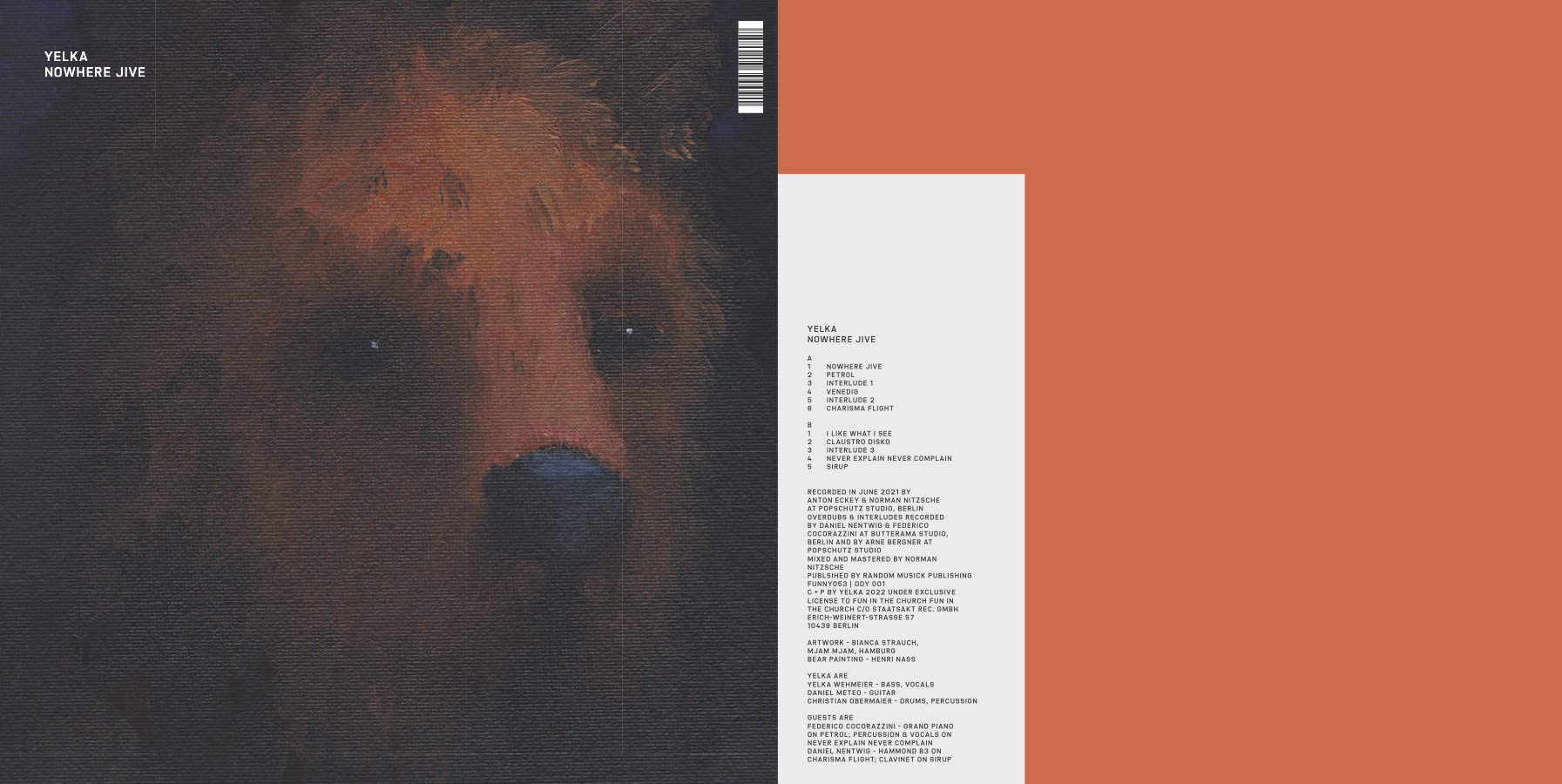
ODY 01 – Nowhere Jive
REVIEW SPIEGEL ONLINE
Würde das Debüt dieser lässigen neue Band nicht aus Berlin, sondern aus Brooklyn kommen, man würde sie bereits als nächstes großes Ding feiern und an ihr das ohnehin anstehende Revival des Post-Rock-Genres festmachen. Könnte man natürlich trotzdem, denn kleine Brötchen backt die Berliner Indie-Supergroup nicht: Ganze zehn Alben sollen bis 2025 veröffentlicht werden, zwei weitere allein noch dieses Jahr. Yelka sind nach der Bassistin und Sängerin Yelka Wehmeier benannt, ehemals Mitglied bei der Punk-Noise-Band Gewalt. Die Gitarre, in verspielter Anlehnung an Vorbilder wie Sam Prekop und »Magic Band«-Virtuose Alex St. Clair, bedient Apparat-Manager, Labelmitbetreiber (Shitkatapult) und Gastro-Entrepreneur Daniel Meteo, am Schlagzeug sitzt Christian Obermaier, mit Wehmeier einst bei der Post-Rockband Eagle Boston aktiv. Schon diese weithin unbekannte Band probte einen Fusion-Sound aus Psychedelik- und Krautrock, der hier gewitzt verfeinert wird. Manchmal postuliert Wehmeier Text-Manifeste (»Don’t forget to move! Lose yourself!«) in den nie allzu monotonen Flow dieser »Claustro Disco« hinein. Yelkas Musik wird als »Postkraut« bezeichnen – sie ist genauso kurios cool, wie dieses Wort klingt.(7.2) (SPIEGEL ONLINE)
REVIEW KRACHFINK
YELKA haben sich mit “Nowhere Jive” einiges vorgenommen. Sie wollen nicht nur komplett auf Social Media verzichten, was man heutzutage schon als komplett wahnsinnig einstuft, sondern auch in 3 Jahren zehn Alben, immer mit Artworks von Bianca Strauch-Freytag” abliefern. Okay, hier wir gehen. Das Trio besteht aus Yelka Wehmeier (zuletzt Bass bei GEWALT), Christian Obermaier und Daniel Meteo. Es benötigt weniger als einen kompletten Durchlauf, um von dem magicmushroomigen Bassspiel total high zu werden und sich mit dem herrlich, jazzigen Krautrock anzufreunden.
Three is a crowd
YELKA bieten auf “Nowhere Jive” keine konventionellen Lieder, es sind eher Fragmente von Ideen, die in nachvollziehbare Strukturen gegossen wurden, das Abseitige aber nie ganz abschütteln können. Vieles wirkt herrlich verschlagen, zeitlos sowieso. Ironischerweise werden einige Songs mit einer unterschiedlichen Anzahl von Hashtags betitelt. Witzig und zeigt vor allem, dass hier das Konzept ist, kein Konzept zu haben und sich auch selbst nicht so ernst zu nehmen. Was aus dem Bauch kommt, ist meistens richtig und wenn es um Kreativität geht auf jeden Fall.
Die reine Überführung
Es passiert viel auf YELKA, auch schon mit Spot darauf und nicht so, dass es man es mit der Lupe suchen muss. Aber es sind keine üblichen Songstrukturen, selbst die Polyrhythmen wirken anders, als man sie kennt (“Venedig”). YELKA sind sich sicher und können genau deshalb den Takt aushebeln, etwas ganz Neues erschaffen, und zwar ohne angestrengt verkopft zu wirken. Manches wurde bewusst so eingefangen, wie es sich wohl im ersten Moment über die Hände ins Instrument gefühlt hat. Keine Nachbearbeitung, kein ins Korsett zwängen, die reine Überführung (“##”).
Ob und was ihr damit jetzt anfangen könnt und sollt, ist eure Sache. In manchem Momente meint man einer hochwertigen Probe beiwohnen zu dürfen und “Nowhere Jive” ist mit Sicherheit keine große Ausbeute für die Playlisten. Aber ein herrliches, beinahe wortloses, Manifest dafür, wie wichtig Groove und Takt sind. (KRACHFINK)
REVIEW JUNGLE WORLD
Mit seinen Anleihen beim Krautrock wirkt das Berliner Trio Yelka auf seinem Debütalbum »Nowhere Jive« zwar gewissermaßen zeitgemäß, zugleich erscheint der Sound der Band aber herrlich aus der Zeit gefallen, leichtfüßig und selbstgenügsam, reduziert und gänzlich unaffektiert.
Einerseits erinnert ihre angejazzte Variante des Post-Rock an die Chicagoer Genre-Ikonen Tortoise und The Sea and Cake, die ihre musikalischen Höhepunkte um die Jahrtausendwende feierten. Andererseits wirkt die Musik von Yelka, in klassischer Besetzung zumeist auf Gitarre, Bass und Schlagzeug beschränkt, gleichsam eingebettet in die Berliner Indie-Musikgeschichte um Plattenfirmen wie Monika Enterprise, Morr Music und Kitty-Yo.
Mit Blick auf das bisherige Treiben der Mitglieder von Yelka ist dies auch keine Überraschung. Die Band ist benannt nach ihrer Bassistin und gelegentlichen Sängerin Yelka Wehmeier, die als Gründungsmitglied bei den ersten Singles und Konzerten der Gruppe Gewalt ebenfalls am Bass mitwirkte.
Der Musikstil ist zwar eher albumorientiert als singlekompatibel, dennoch findet sich mit »Charisma Flight« ein herausragendes Stück auf der LP.
Schlagzeuger Christian Obermaier wiederum arbeitete in der Vergangenheit unter anderem mit Barbara Morgenstern und mit Schneider TM; Gitarrist Daniel Meteo ist außer für seine eigenen Electronica-Alben auch als Mitbetreiber des Berliner Elektro-Labels Shitkatapult bekannt.
»Nowhere Jive« besteht zum größten Teil aus instrumentalen Stücken, und wenn Wehmeier singt, dann oft repetitiv; auf der ersten Auskopplung »Petrol« wiederholt sie lediglich das titelgebende Wort, während Meteos Gitarrenläufe immer wieder in dissonante Akkorde münden.
Der Musikstil ist zwar eher albumorientiert als singlekompatibel, dennoch findet sich mit »Charisma Flight« ein herausragendes Stück auf der LP, bei dem sich über einem stoischen Shuffle-Beat und Wehmeiers subtilem Bass die Gitarre und eine Orgel gegenseitig umspielen und dabei nach und nach hin zu einer Klimax steigern. Ein zweites Yelka-Album mit dem Titel »1976« soll bereits im Sommer erscheinen. (JUNGLE WORLD)
REVIEW JUNGLE WORLD
Mit seinen Anleihen beim Krautrock wirkt das Berliner Trio Yelka auf seinem Debütalbum »Nowhere Jive« zwar gewissermaßen zeitgemäß, zugleich erscheint der Sound der Band aber herrlich aus der Zeit gefallen, leichtfüßig und selbstgenügsam, reduziert und gänzlich unaffektiert.
Einerseits erinnert ihre angejazzte Variante des Post-Rock an die Chicagoer Genre-Ikonen Tortoise und The Sea and Cake, die ihre musikalischen Höhepunkte um die Jahrtausendwende feierten. Andererseits wirkt die Musik von Yelka, in klassischer Besetzung zumeist auf Gitarre, Bass und Schlagzeug beschränkt, gleichsam eingebettet in die Berliner Indie-Musikgeschichte um Plattenfirmen wie Monika Enterprise, Morr Music und Kitty-Yo.
Mit Blick auf das bisherige Treiben der Mitglieder von Yelka ist dies auch keine Überraschung. Die Band ist benannt nach ihrer Bassistin und gelegentlichen Sängerin Yelka Wehmeier, die als Gründungsmitglied bei den ersten Singles und Konzerten der Gruppe Gewalt ebenfalls am Bass mitwirkte.
Der Musikstil ist zwar eher albumorientiert als singlekompatibel, dennoch findet sich mit »Charisma Flight« ein herausragendes Stück auf der LP.
Schlagzeuger Christian Obermaier wiederum arbeitete in der Vergangenheit unter anderem mit Barbara Morgenstern und mit Schneider TM; Gitarrist Daniel Meteo ist außer für seine eigenen Electronica-Alben auch als Mitbetreiber des Berliner Elektro-Labels Shitkatapult bekannt.
»Nowhere Jive« besteht zum größten Teil aus instrumentalen Stücken, und wenn Wehmeier singt, dann oft repetitiv; auf der ersten Auskopplung »Petrol« wiederholt sie lediglich das titelgebende Wort, während Meteos Gitarrenläufe immer wieder in dissonante Akkorde münden.
Der Musikstil ist zwar eher albumorientiert als singlekompatibel, dennoch findet sich mit »Charisma Flight« ein herausragendes Stück auf der LP, bei dem sich über einem stoischen Shuffle-Beat und Wehmeiers subtilem Bass die Gitarre und eine Orgel gegenseitig umspielen und dabei nach und nach hin zu einer Klimax steigern. Ein zweites Yelka-Album mit dem Titel »1976« soll bereits im Sommer erscheinen. (JUNGLE WORLD)
REVIEW FLIGHT 13
Aus dem Rahmen fallendes Album, das im entschlackten Trio-Look (Gitarre, Schlagzeug, Bass) ohne ein Gramm Fett zuviel, ohne Plüsch und Brimborium und elektronische Zutaten eine großartige instrumentale Essenz präsentiert, die in dieser Qualität schwer beeindruckt, auch weil spielerisch gnadenlos auf nicht ausgetretenen Pfaden unterwegs. Ein kunstvoller, an den Chicago-Postrock der 90er angelehnter Sound mit jazzigen Zutaten, ungeraden Rhythmen, exquisitem Zusammenspiel und minimalistischer Überzeugungskraft und intensiver Dynamik. Kunstvolle Fast-Instrumentals, die wie eine Mischung aus The Sea & Cake, Tortoise, Fugazi und Krautrockgarnitur klingen. Am virtuos gespielten Schlagzeug sitzt Christian Obermaier (einst in der band von Schneider TM), die Gitarre manövriert äusserst eindrucksvoll mit einem sehr eigenen Sound und einer ebenso eigenen Art des Biss Daniel Meteo (Manager von Apparat, Musikverleger (Random Noize) und Labelmacher (Shitkatapult, The Album Label), dazu am Bass Yelka Wehmeier, zuletzt als Bassistin in der ersten Besetzung von Patrick Wagners Gewalt dabei, die mit stoischen, in warmem Sound gehaltenen fingerfertige Bassfiguren als Kleber des Ganzen fungiert. Das exquisite Zusammenspiel von Bass und Drums erklärt sich aus dem Wirken von Obermaier und Wehmeier bei der 2013 in der sträflich übersehenen Berliner Post-Rock-Band Eagle Boston. Klasse Album! (FLIGHT 13)
